Ida B. Wells
Born into slavery in 1862, Ida B. Wells went on to become an influential reformer and leader in the African American community. A Southern black woman living in a time when little social power was available to people of her race or gender, Ida B. Wells made an extraordinary impact on American society through her journalism and activism. Best-known for her anti-lynching crusade, which publicly exposed the extralegal killings of African Americans, Wells was also an outspoken advocate for social justice in issues including womens suffrage, education, housing, the legal system, and poor relief.
In this concise biography, Kristina DuRocher introduces students to Wellss life and the historical issues of race, gender, and social reform in the late nineteenth- and early twentieth-century U.S. Supplemented by primary documents including letters, speeches, and newspaper articles by and about Wells, and supported by a robust companion website, this book enables students to understand this fascinating figure and a contested period in American history.
Kristina DuRocher is an Associate Professor of History at Morehead State University, Kentucky.
Routledge Historical Americans
Series Editor: Paul Finkelman
Routledge Historical Americans is a series of short, vibrant biographies that illuminate the lives of Americans who have had an impact on the world. Each book includes a short overview of the persons life and puts that person into historical context through essential primary documents, written both by the subjects and about them. A series website supports the books, containing extra images and documents, links to further research, and where possible, multi-media sources on the subjects. Perfect for including in any course on American History, the books in the Routledge Historical Americans series show the impact everyday people can have on the course of history.
Woody Guthrie: Writing Americas Songs
Ronald D. Cohen
Frederick Douglass: Reformer and Statesman
L. Diane Barnes
Thurgood Marshall: Race, Rights, and the Struggle for a More Perfect Union
Charles L. Zelden
Harry S. Truman: The Coming of the Cold War
Nicole L. Anslover
John Winthrop: Founding the City upon a Hill
Michael Parker
John F. Kennedy: The Spirit of Cold War Liberalism
Jason K. Duncan
Bill Clinton: Building a Bridge to the New Millennium
David H. Bennett
Ronald Reagan: Champion of Conservative America
James H. Broussard
Laura Ingalls Wilder: American Writer on the Prairie
Sallie Ketcham
Benjamin Franklin: American Founder, Atlantic Citizen
Nathan R. Kozuskanich
Brigham Young: Sovereign in America
David Vaughn Mason
Mary Lincoln: Southern Girl, Northern Woman
Stacy Pratt McDermott
Oliver Wendell Holmes, Jr.: Civil War Soldier, Supreme Court Justice
Susan-Mary Grant
Belle La Follette: Progressive Era Reformer
Nancy C. Unger
Harriet Tubman: Slavery, the Civil War, and Civil Rights in the Nineteenth Century
Kristen T. Oertel
Muhammad Ali: A Man of Many Voices
Barbara L. Tischler
Andrew Jackson: Principle and Prejudice
John M. Belohlavek
Sojourner Truth: Prophet of Social Justice
Isabelle Kinnard Richman
Ida B. Wells: Social Reformer and Activist
Kristina DuRocher
Patrick Henry: Proclaiming a Revolution
John A. Ragosta

http://www.routledge.com/cw/historicalamericans
First published 2017
by Routledge
711 Third Avenue, New York, NY 10017
and by Routledge
2 Park Square, Milton Park, Abingdon, Oxon, OX14 4RN
Routledge is an imprint of the Taylor & Francis Group, an informa business
2017 Taylor & Francis
The right of Kristina DuRocher to be identified as author of this work has been asserted by her in accordance with sections 77 and 78 of the Copyright, Designs and Patents Act 1988.
All rights reserved. No part of this book may be reprinted or reproduced or utilized in any form or by any electronic, mechanical, or other means, now known or hereafter invented, including photocopying and recording, or in any information storage or retrieval system, without permission in writing from the publishers.
Trademark notice: Product or corporate names may be trademarks or registered trademarks, and are used only for identification and explanation without intent to infringe.
Library of Congress Cataloging-in-Publication Data
Names: DuRocher, Kristina.
Title: Ida B. Wells: social reformer and activist / Kristina DuRocher.
Description: New York, NY: Routledge, [2016] | Includes bibliographical
references.
Identifiers: LCCN 2016005150 | ISBN 9781138786875 (hardback) | ISBN
9781138786882 (pbk.) | ISBN 9781315767024 (ebook)
Subjects: LCSH: Wells-Barnett, Ida B., 18621931. | African American
womenBiography. | African American women civil rights
workersBiography. | African American women social reformersBiography.|
African American women journalistsBiography. | LynchingUnited
StatesHistory. | Civil rights workersUnited StatesBiography. |
Social reformersUnited StatesBiography.
Classification: LCC E185.97.W55 D87 2016 | DDC 323.092dc23
LC record available at http://lccn.loc.gov/2016005150
ISBN: 978-1-138-78687-5 (hbk)
ISBN: 978-1-138-78688-2 (pbk)
ISBN: 978-1-315-76702-4 (ebk)
Typeset in Minion and Scala Sans
by Apex CoVantage, LLC
The way to Right Wrongs is to turn the Light of Truth upon Them. Ida B. Wells 1
In 1883, Ida B. Wells, a twenty-one year-old black woman, boarded a train in Memphis, Tennessee to commute to her rural teaching job. On September 15, as on countless other days, she purchased her thirty-eight cent ticket and boarded the first-class car. A little under five feet tall, Wells wore a full-length dress covered by a linen duster with a hat and gloves. She carried a satchel, a newspaper, and a parasol, all trappings of a middle-class traveler.2 She later recalled in her autobiography that when the train was underway, the conductor, instead of collecting her ticket, handed it back to me. She remembered thinking to herself, If he didnt want the ticket I wouldnt bother about it and resumed reading her newspaper.3 The conductor continued gathering the remaining passengers tickets and then returned to her side, informing her that she had to transfer to the other train car. Surprised, Wells reminded the conductor that the forward car was a smoker.4


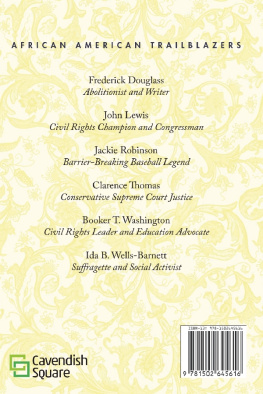
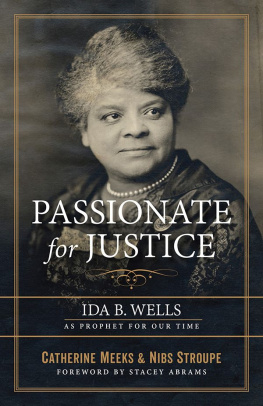

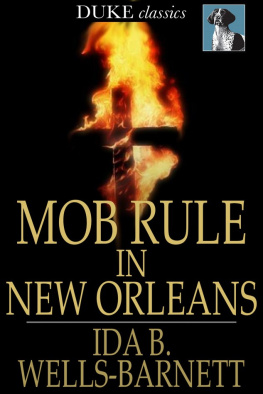
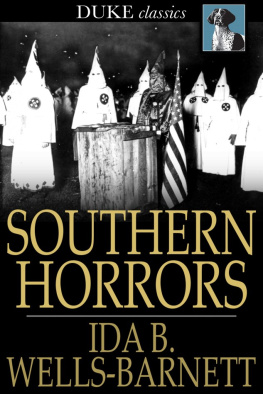


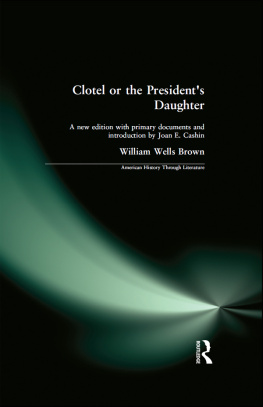





 http://www.routledge.com/cw/historicalamericans
http://www.routledge.com/cw/historicalamericans